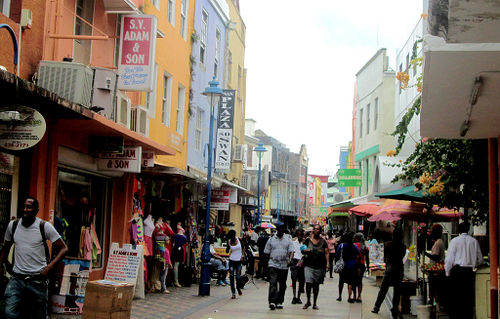Gynopedia needs your support! Please consider contributing content, translating a page, or making a donation today. With your support, we can sustain and expand the website. Gynopedia has no corporate sponsors or advertisers. Your support is crucial and deeply appreciated.
Bridgetown
OVERVIEW
Contraception (Birth Control)
General Note: There are many types of contraceptives, also known as "birth control," including IUDs, oral contraceptives, patches, shots, and condoms, etc. If you would like to view a full list, click here.
Laws & Social Stigmas
In Barbados, you can obtain birth control pills or condoms over-the-counter. No prescription is necessary.[1] [2]
According to a 2015 report, it was found that about 60% of women in Barbados (who are married/in unions and of reproductive age) use any form of contraception, including traditional methods, which was slightly lower than the Caribbean average for contraceptive use (62%). Furthermore, it was found that about 16% of women in Barbados had unmet family needs. The most common forms of contraception were birth control pills (used by about 22% of women) and condoms (used by about 20% of women). This was followed by contraceptive injectables (5%), female sterilization (5%), and IUDs (3%). Less than one person of women used contraceptive implants, male sterilization, or female barrier methods as their form of contraception, respectively. As for traditional methods, about 2% of women used withdrawal, also known as the "pull-out method," and 1% used the rhythm method.[3]
What to Get & Where to Get It
Costs
Emergency Contraception (Morning After Pill)
Important Notes: Emergency contraception may prevent pregnancy for three days (72 hours) and sometimes five days (120 hours) after unprotected sex. Take EC as soon as possible after unprotected sex. If you don't have access to dedicated EC, oral contraceptives can be used as replacement EC, but remember the following: 1) Only some contraceptives work as EC 2) Different contraceptives require different dosages and time schedules to work as EC 3) You must only use the first 21 pills in 28-day packs and 4) They may be less effective than dedicated EC. For general information on emergency contraceptives, click here and here.
Laws & Social Stigmas
What to Get & Where to Get It
Note: The longest-lasting EC is currently ellaOne. It lasts up to 5 days (120 hours) after unprotected sex. Check to see if your country carries ellaOne. If your country doesn't carry ellaOne, copper IUDs may also prevent pregnancy up to 5 days after unprotected sex. If none of these options are available, and it's been over 3 days since you had unprotected sex, you can still take EC, which may work up to 5 days. Note that EC pills are not 100% effective and should be taken as soon as possible.
Costs
Sexually Transmitted Infections (STIs/STDs)
Important Notes - Learn about PEP and PrEP: If you think that you've been recently exposed to HIV (i.e. within 72 hours), seek out PEP (Post-Exposure Prophylaxis). It's a month-long treatment to prevent HIV infection after exposure, and it may be available in your city. Take PEP as soon as possible. For more information, click here. If you are at risk of HIV exposure, seek out PrEP (Pre-Exposure Prophylaxis). It's a daily oral pill that can prevent HIV infection before exposure. To learn more about PrEP, click here.
Laws & Social Stigmas
What to Get & Where to Get It
Testing Facilities
Support
Costs
Medications & Vaccines
Laws & Social Stigmas
What to Get & Where to Get It
Costs
Menstruation
Note: In addition to pads and tampons, you can also use menstrual cups and menstrual underwear for your period. To learn more about menstrual cups, click here. To learn more about menstrual underwear, click here.
Laws & Social Stigmas
What to Get & Where to Get It
Costs
Gynecological Exams
Laws & Social Stigmas
What to Get & Where to Get It
Costs
Pregnancy
Laws & Social Stigmas
What to Get & Where to Get It
Costs
Abortion
Important Note: There are two main types of abortions: medical (also known as the "abortion pill") and surgical (also known as "in-clinic"). For medical abortions, you take a pill to induce abortion. For surgical abortions, a procedure is performed to induce abortion. For general information about medical and surgical abortions, click here.
Laws & Social Stigmas
What to Get & Where to Get It
Costs
Advocacy & Counseling
Laws & Social Stigmas
What to Get & Where to Get It
Costs
List of Additional Resources
- Equaldex Barbados: This website provides information on LGBTQ rights and laws in Barbados. It is important to note that homosexuality is illegal. The laws explicitly states that male homosexual activity is illegal, though it's a bit more ambiguous regarding female homosexuality. While the anti-homosexual laws are rarely enforced, they are important to be aware of. The laws regarding changing gender are ambiguous. There are no laws to protect LGBTQ people from discrimination, however activists would like to change laws surrounding LGBTQ rights and the first pride parade in Barbados was held in 2018.
- Barbados Council of Women: Lyrias, Christchurch. , Barbados
- Caribbean Women's (International) Network: Barbados Secretariat: Townhouse #2, Lot B12, Graeme Hall Park, Christ Church, Barbados, Email: cwn@caribsurf.com
- Centre for Gender and Development Studies: University of the West Indies, P.O. Box 64, Bridgetown, Barbados
- Development Alternatives with Women for a New Era (DAWN): Caribbean Secretariat: 11 Gibbons Terrace, Christchurch, Barbados, W.Indies, Tel: (246) 420 4474
- Institute of Social and Economic Research: University of the West Indies, P.O. Box 64, Bridgetown, Barbados
- Women and Development Unit (WAND): Consultancy Services, School of Continuing Studies, University of the West Indies, Extra-Mural Department, Pinelands, St. Michael UWI, Barbados
- WAND (Women and Development Unit): Elaine Hewitt, c/o University of West Indies, Cave Hill Campus, St. Michael, Barbados, tel: +1-809-436-6312, fax 436-3006
References
